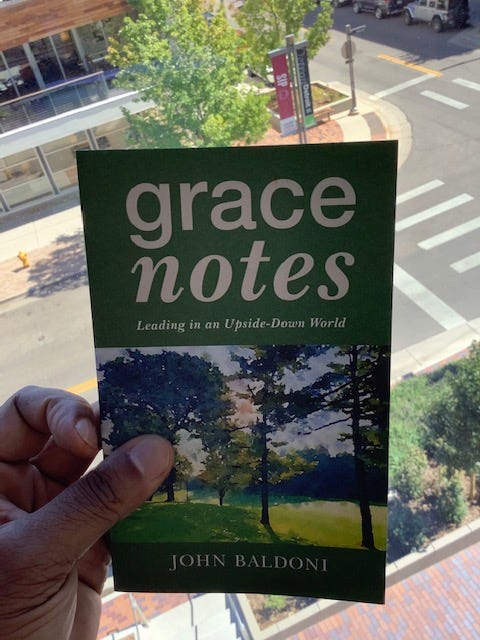The Book On Navigating Today’s Paradoxical and Enigmatic World
For many of us, the Covid-19 pandemic has created uncertainty and at times upheaval in our lives. Now, new variants are creating a fresh set of vaccine mandates and mask restrictions that have us on edge.
Having weathered a challenging set of months, we are not the same people we were prior to February 2020. With all of this, a new reality is setting in — one which will require us to approach our lives differently moving forward.
The recently published book Grace Notes: Leading in an Upside-Down World (2021) is a great read for leaders seeking to reflect on the resilience and endurance needed to successfully navigate these unprecedented times.
The narrative of the book, which captures the ebbs and flows that many of us have been experiencing in our life, starts in a place of darkness before ending in a place of light and hope. It reveals how leaders can foster resiliency to more effectively direct themselves as well as their teams as times continue to evolve. Punctuated with aesthetically rich images, readers will walk away from reading the book with greater insights on how to embrace a life of greater purpose and grace.
Author John Baldoni is an Ann Arbor, Michigan-based executive coach who has worked with scores of senior leaders in virtually every industry from pharmaceutical to real estate, packaged goods to automobiles, finance to healthcare. He has also authored over 800 leadership columns for a variety of digital publications including Forbes, Harvard Business Review, and Inc.com.
Baldoni admits that the book begins in kind of a dark place replete with a philosophical exegesis of the lockdown. But it ends, he says, in a hopeful place that’s designed to help leaders make things better for others.
“More than anything this book is a set of reflections that are shaped by recent events, but that points us forward beyond the pandemic. It is aligned with my mission of helping women and men become more effective leaders by learning to live and lead with greater purpose and grace.”
Baldoni says that he’s always been, or at least for a long time, intrigued with the topic of grace which he has written about in a couple of previous books. The uncivil discourse, he says, around the pandemic is what led him to address the topic of grace head-on in this most recent book.
“I believe that there's more good in our world than there is bad even though the bad makes the headlines and the news. And I believe that social media amplifies the negative through what I would call a "gotcha culture." So I wanted to celebrate what grace is, the catalyst for the greater good. “
Baldoni says that he was drawn to study how leaders act and mobilize others through their energy. It’s here where he discovered stories of people doing good things, both in history as well as during current times.
"Grace Notes' represents a set of reflections I had during the first year of COVID. It talks about the responsibility that leaders need to demonstrate when it comes to bringing people together — the need to address the fear, the dislocation, and the isolation that so many of us are feeling.”
He extols the virtues of leaders showing up with a spirit of empathy and kindness.
“I think, fortunately, now we're seeing kindness celebrated. Lots of people seem to be talking about it, perhaps as a result of the fact that with the pandemic, none of us have been spared. We’ve all been inconvenienced, and too many of us have suffered significant loss whether it be that of a loved one, the loss of a job, or for some people the loss of their identity.”
Baldoni continues:
“Fortunately, I think the economy's coming back, which is good. Along with that more and more of us are starting to reestablish our footing which is a good thing.”
Referencing the major theme of his book, he asserts that grace is something that binds us together. And while many of us associate grace with a faith-based tradition, and it certainly is, he believes it's really linked to our humanity as the ancient Greeks talked about it.
Asked to share a little about his definition of grace, he had this to offer:
“Well, Hinduism has it. Judaism, Islam, all of these faiths do it. And coincidently, we as human beings all have some semblance of the altruism gene, which is our ability and desire to care for others. That's where grace comes in.”
He believes that his work around grace is all about a larger call to help people see that it is a possibility.
“I think people know that already. But I wanted to shine a light on it and make it something to keep in mind. Because being a leader in today's world is really tough, how you do it is really important.”
Baldoni believes that the opportunity to begin playing piano in hospital lobbies a few years ago afforded him the opportunity to witness daily acts of grace by hospital staff. He says that this provided him with some unique perspectives on grace
“People would come up and just want to talk and just hear the music. For me, it was a golden opportunity to see grace in action.”
In offering a concluding thought about “Grace Notes,’ Baldoni adds:
“I want readers to take stock of what we've experienced amid the pandemic. Because I don't think we can fully capitalize on creating a new normal unless we understand where we have come. Writing the book has really been a labor of love for me. I hope it significantly impacts some readers while simply provoking the thinking of others in terms of how they can make a positive difference in the world.”





